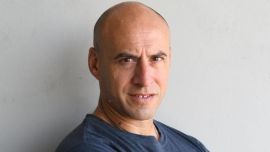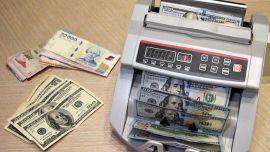Argentine business executives are resigned to the fact that their preferred candidate is going to lose the presidential election, so now they just want to know what the next government’s plan is to save the economy.
That was the overwhelming sentiment among the nearly 1,000 bankers, executives, academics and analysts who converged on the coastal city of Mar del Plata last week for the annual IDEA conference. Now that the initial shock of President Mauricio Macri’s crushing defeat in primary elections earlier this year has worn off, they’re desperate to know how Peronist hopeful Alberto Fernández plans to tame inflation, boost growth, encourage investment and set taxes.
Their anxiety is understandable. As the October 27 election approaches, the economy is in a deep recession, the peso is down 35 percent from the start of the year, capital controls are back and it looks like bondholders are heading for a restructuring. Even more than the details of the plan to push out debt maturities, what Argentina’s businesses want to know is whether anyone has a credible plan to turn things around.
“Argentina first needs an economic plan,” Julio Figueroa, the chief executive officer of Citigroup Inc’s Argentina operations, told journalists at the event. “No magic plan is needed, just a realistic one.”
The sentiment in Mar del Plata seemed to be echoed about 5,500 miles away in Washington, where International Monetary Fund Managing Director Kristalina Georgieva said Thursday that talks over Argentina’s credit line can continue once the next government’s policy framework is revealed.
“We will be very interested to see,” Georgieva said, adding that the IMF is “fully committed to work with Argentina and make sure that there can be policy improvements.”
Back in Mar del Plata, conference attendees were disappointed they didn’t get any fresh perspective from Fernández himself. The agenda listed an appearance by the candidate as “to be confirmed,” but in the end he didn’t show up. Macri spoke via video conference, assuring the audience that his campaign wasn’t over yet. He trailed the challenger by 16 percentage points in the primary.
Data released at the conference didn’t exactly lift spirits. In a survey of 240 business leaders presented by the D’Alessio IROL consulting firm, held in October after the primaries, only 34 percent of the companies expect to increase its sales in the next 12 months, compared with 70 percent when they were asked in July.
It was all depressing enough to create quite a sizable crowd at the bar. Between quaffing cocktails and nibbling on tapas, executives traded gossip on the potential makeup of Fernandez’s cabinet and how that might affect policy.
But there was also the feeling that maybe it didn’t even matter, that things were really kind of hopeless.
Marcos Galperín, the chief executive officer of the online retailer and payments processor MercadoLibre Inc, struggled to figure out how Fernández was going to pay for all the social spending he’s promised during his campaign.
“There is no way for six million formal workers to generate enough resources for 15 million poor people,” he said.
by Jorgelina do Rosario, Bloomberg




















Comments